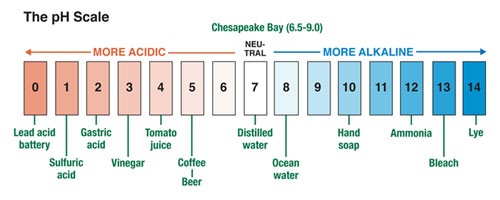|
Acid Test for the Great Shellfish Bay?
March 2012 • Volume 11, Number 1
Stephen P. Nash
As CO 2 levels are rising in the atmosphere, acidity levels are rising in the ocean, which may be slowing growth rates for coral reefs, oysters, and other shell-building species. Could changes in acidity threaten the survival of oysters in the Chesapeake Bay at a time when oyster farming here is on the rise? To find out more, two researchers have come on a late-June morning to the shore of Maryland's Severn River, not far from the Bay, to set up experiments. To create a kind of time machine, the researchers will pump CO 2 into a marked-off square of river water, creating acidity levels as they will be in the future, circa 2050 and 2100. The Severn River project is part of a suite of new and recent research on the effects of rising CO 2 levels on the Chesapeake. Whitman Miller is studying how acidifying waters would affect oysters; Tom Arnold is looking at what would happen to seagrasses. more . . .
Excess atmospheric CO 2 turns marine waters acidic. In the Chesapeake additional CO 2 may come from nutrients. more . . . |
 |
When the larvae a Mike Congrove's oyster hatchery began dying in large numbers last June, he wasn't sure why. Larval production dropped from 100 million larvae a week down to 10 million. He had worked in the business long enough to know there could be multiple causes. In this dieoff, however, one major change drew his attention: the river water he was using had lower levels of pH. The Piankatank River — at least for awhile — had become more acidic. more . . . |
|
|

